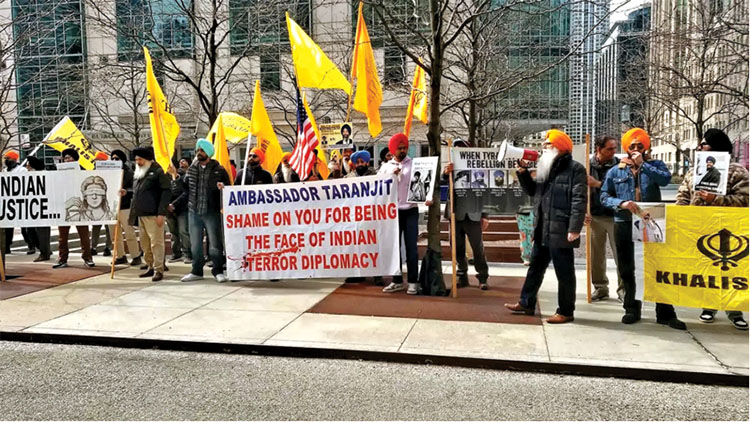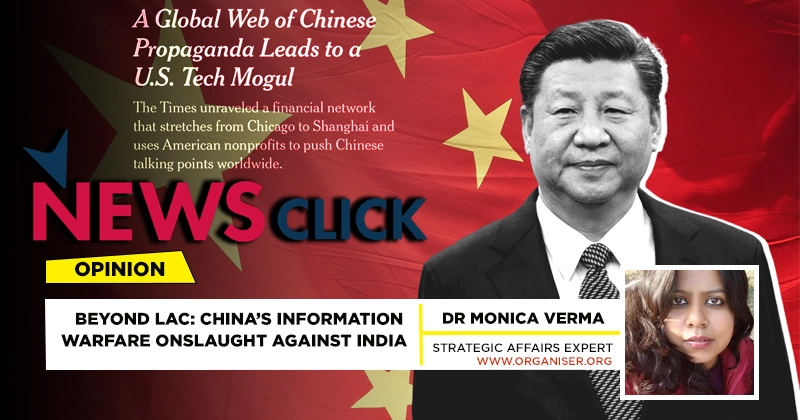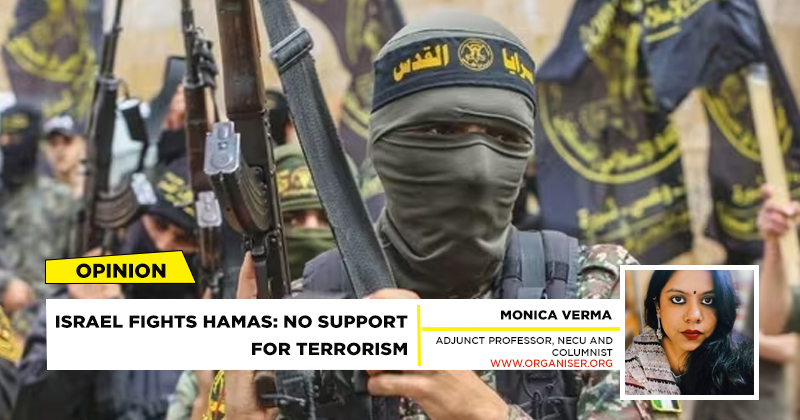September has been a month of great diplomatic success for Bharat. New Delhi has achieved a key milestone this month by organising the magnificent G20 Summit. This summit has shown that Bharat is fully-capable of handling such large diplomatic gatherings while at the same time deftly navigating the intricacies of great power politics as manifested at such forums.
While Bharat was scripting success after success at the summit, a leader from a western country was secretly meeting his allies in the Five Eyes alliance, which consists of UK, US, Australia, New Zealand and Canada, in order to convince them to issue a joint statement criticising Bharat.
According to Canadian Prime Minister Justin Trudeau, Bharat was responsible for the murder of Hardeep Singh Nijjar, a Khalistani terrorist whose body was found with multiple gunshot wounds inside a vehicle in Canada in June 2023. Trudeau wanted these countries to pressurise Bharat over this and raise the issue during the G20 summit as well. But as it turned out, Trudeau’s plea fell flat and all his allies refrained from raising this issue at the event.
UNSUBSTANTIATED ALLEGATION
What the Canadian Prime Minister couldn’t secure through diplomatic channels, he tried to seek on his own. A few days after the summit, Trudeau attacked Bharat from the floor of Canadian parliament by accusing the country of murdering a Canadian citizen on Canadian soil. Not just this, he also reached out to other countries to once again muster up some diplomatic support against Bharat but his bid to launch an anti-Bharat tirade failed this time as well. Clearly, Trudeau found himself isolated and with no backing from his allies in sight, within a single day he reversed his statement and said that all he is expecting from Bharat is a proper redressal of the issue.
TURN OF EVENTS
TRUDEAU VISIT
Canada PM Justin Trudeau attended the G20 Summit in New Delhi. In a meeting on the sidelines, PM Modi raised Bharat’s concerns about anti-Bharat activities in Canada. Trudeau could not leave as per schedule, had to wait in New Delhi for two days. Officially it was said his aircraft developed a ‘technical snag’. Unconfirmed reports indicate a huge amount of drugs were found on his aircraft, and it was grounded as a result
ALLEGATION
On reaching home, Trudeau accused Bharat of being responsible for the killing of Hardeep Singh Nijjar, a separatist Khalistani terrorist. Nijjar was found shot dead on June 19 in Surrey, Vancouver. Canada shared no specific information with Bharat despite the allegation. Bharat outrightly refuted the allegation, calling it ‘absurd, motivated and politically driven’ At homeground, Trudeau is now under increasing pressure from opposition leader Pierre Poilievre to come out with the facts related to this allegation. Notably, the Royal Canadian Mounted Police has refused to corroborate Trudeau’s charge, saying it is investigating Nijjar’s killing and is not in a position to ‘discuss specifics’
EXPULSIONS
After Trudeau’s remarks in Parliament, Canadian Foreign Minister Melanie Joly said she had ordered the expulsion of “a senior Indian diplomat” Bharat responded by expelling the Canadian intelligence agency station chief in Bharat, and asked him to leave within five days.
TRAVEL ADVISORIES
Canada issued a travel advisory to its citizens to “exercise a high degree of caution in Bharat due to the threat of terrorist attacks throughout the country.” It further advised against travel to Jammu and Kashmir citing “threat of terrorism, militancy, civil unrest and kidnapping”. New Delhi also issued a strongly-worded advisory to Bharatiya nationals in Canada, and students in particular, warning against “anti-India activities” and “politically-condoned hate crimes” and urged all Bharatiya citizens to “exercise caution”. Bharat suspended visa services for Canadian nationals indefinitely
What this episode tells us about Justin Trudeau and his penchant for playing to the Khalistan gallery is important, but what is also significant is that this incident has shown the limits of Canadian power and Western solidarity in a changing world scenario when Bharat is rising as a major player globally.
Firstly, Justin Trudeau was motivated by a sinister desire to implicate Bharat for an action for which there is no concrete proof. Hardeep Singh Nijjar was no ordinary Canadian citizen. He was Bharat’s most-wanted terrorist who also had an Interpol notice against him. He was responsible for multiple targeted killings in Punjab and was also accused of reviving the dead Khalistan militant outfits in the form of ‘Khalistan Tiger Force’.
According to our intelligence agencies, Nijjar was in touch with Pakistani agents and had even travelled to Pakistan in 2013-14. Despite being based in Canada, Nijjar was actively funding and recruiting young men from Punjab for the Khalistan cause in order to carry out terror attacks. Although he was engaged in such nefarious activities against Bharat on Canadian soil, the Trudeau government was far from taking any action against him. Despite repeated requests from Bharat, Nijjar was a much free man who used to regularly participate in anti-Bharat protests in the country.

The stand of Canadian government on Khalistan issue has always been a very problematic one. According to Trudeau, it is not a threat to Bharat’s sovereignty and territorial integrity as much it is a “freedom of speech” issue. Trudeau has often invoked this phrase whenever Bharat has sought action against the growing Khalistani menace on Canadian soil.
RANK OPPORTUNISM
One may believe that Trudeau is actually a free-speech absolutist who wants nothing but liberty for each of his countrymen but in reality he is nothing but an appeaser who is ready to shield even terrorists in order to save his political fortunes.
Trudeau’s Liberal Party of Canada had failed to secure a majority on its own in the elections. Due to this, his government is surviving with support from the New Democratic Party (NDP), an outfit that is headed by Jagmeet Singh. Jagmeet Singh is a staunch Khalistani separatist who has built a career by pandering to the Khalistani elements. In 2017, he became the first Sikh leader to head a political party in Canada when he became the chief of the Left-leaning NDP. Today, a large majority of Sikhs may not even identify with the Khalistan cause but politically it is kept alive in Canada because of its value in vote-bank politics. Trudeau, in refusing to act against these elements despite multiple requests by Bharat, comes across as nothing but a typical opportunist politician.
Over time, Canada has become notorious for shielding many gangsters who have left Punjab as well as Khalistanis who are trying to revive the cause from foreign shores. It was in pursuit of this appeasement that Trudeau not only launched a failed attempt to gather diplomatic support against Bharat at G20 but he also ended up expelling a Bharatiya diplomat, a 1997-batch IPS officer and station chief of RAW operations in the country after accusing Bharatiya government of orchestrating terrorist Hardeep Singh Nijjar’s murder.
DIPLOMATIC BLUNDER
Justin Trudeau was acting in the hope that his pathetic attempt to please the domestic vote-bank would receive support from Canada’s international allies in the G7 and Five Eyes grouping. But if there is an example of the biggest diplomatic blunder in the recent years, then it has to be what Justin Trudeau has attempted against Bharat this week. Even a novice in international relations would know that this bid would fail massively. The reason is that in the last decade, Bharat has emerged as a player that is difficult to be ignored by any of the major countries. This also includes the West that may not even be happy about Bharat’s rise, but it still has to support it because of the rising challenge from China’s assertive actions. The biggest proof of this came in the joint consensus-based declaration at the G20 summit, when the West climbed down from its position of condemning Russia over Ukraine war in order to make sure that G20 stays relevant in wake of a mounting challenge from alternative groupings such as BRICS.
Trudeau‘s goals are laughable in comparison to what the West thinks Bharat can do for a stable international order. Bharat’s importance in holding a free and open rules-based order in the Indo-Pacific region is a case in point. Bharat’s capabilities have come as an assurance in the face of China’s Wolf Warrior diplomacy. It is for this reason that many countries have made Bharat a key cornerstone of their Indo-Pacific strategy.
Not just this, Bharat’s emerging economy has also come as a saving grace for many of Canada’s own allies and that includes United Kingdom, Australia and New Zealand as well. All these countries are impressed by Bharat’s market potential and are courting Bharat to have favourable trade ties. In fact, Justin Trudeau himself wants to seal a trade deal with Bharat in order to save Canada’s fledgeling economy. However, his appeasement of Khalistanis has not only jeopardised Canada’s relations with Bharat for a long time to come, but his diplomatic blunder will now lead to an increased isolation of Canada even in the western world.
If there was a choice between a healthy and meaningful partnership with Bharat and an appeasement of Khalistanis for votes, Trudeau seems to have erred big time in choosing the wrong side. The scope for Justin Trudeau to mend his ways has become negligible now. It is unfortunate for Canada that it will have to live with the repercussions of its leader’s actions for a long time to come.
Dr Monica Verma is a New Delhi-based strategic affairs expert. She is currently teaching International Relations at NECU as an adjunct faculty and her articles continue to appear on leading outlets.
























Comments